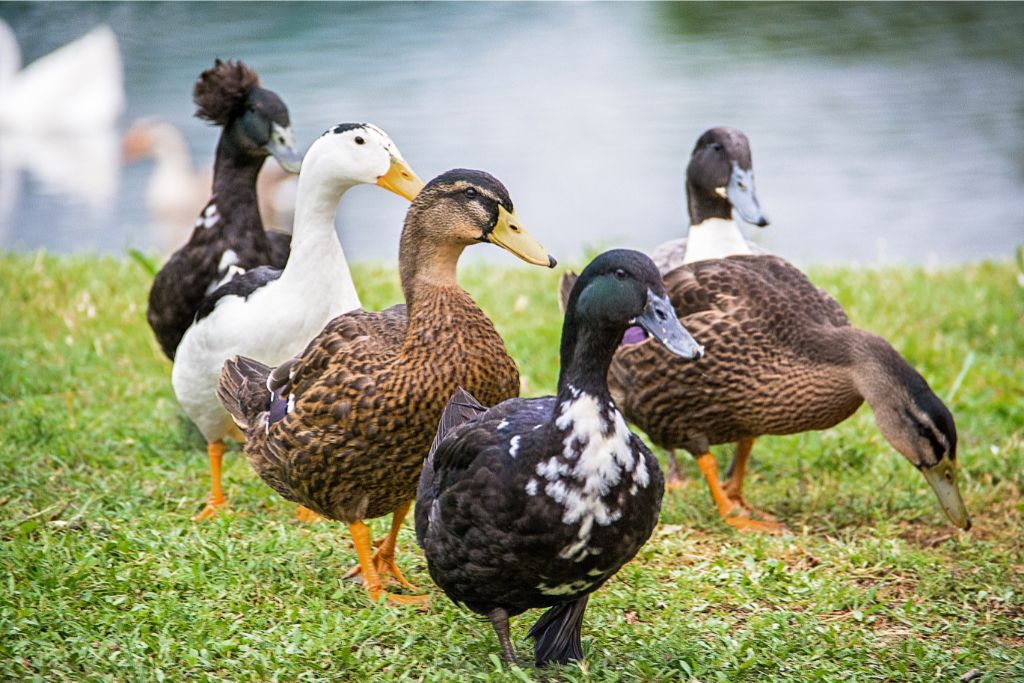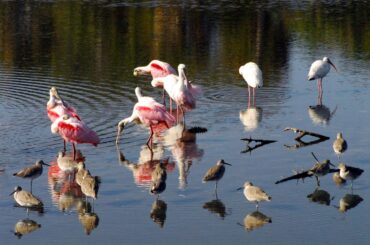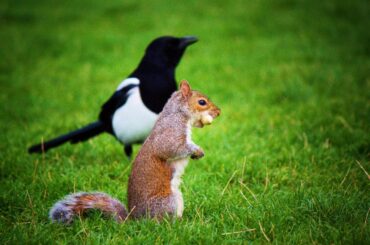Are you curious about what ducks can munch on? Have you ever wondered if strawberries are on the menu for these quacking companions? The truth concerning whether or not ducks can appreciate strawberries will be unveiled. It’s essential to know what foods are safe for ducks as their well-being and health depend on them.
Ducks are known for their love of water, but what about strawberries? Understanding what ducks can eat is crucial because their diet affects their overall health. Keeping ducks happy and healthy requires knowledgeable feeding decisions, which this article provides.
Can Ducks Eat Strawberries?

Yes! Ducks can indeed eat strawberries, but it’s essential to provide them in moderation. Strawberries are a sweet and juicy treat that ducks usually enjoy. Their primary diet should consist of pellets specially formulated for their nutritional needs. They do enjoy eating strawberries on occasion.
Vitamin C and other elements found in strawberries are helpful for ducks. Their immune system and general health are improved by taking vitamin C. This fruit also contains fiber and antioxidants that assist digestion and protect ducks against toxic chemicals.
When giving strawberries to ducks, remember to cut them into small, manageable pieces to prevent choking. Ensure the strawberries are fresh and clean to keep our feathered friends healthy and happy.
The Duck Diet: What Ducks Typically Eat
In the vibrant world of waterfowl, ducks lead an exciting life, and their diet is crucial in keeping them healthy and happy. So, what do ducks typically eat in the wild?
Aquatic Delights
Water lilies, pondweed, and duckweed are ducks’ favorites. These lush greens are tasty and nutritious.
Duck Pellets
Commercial duck pellets are specially formulated for their dietary needs. They offer a balanced mix of nutrients to keep your ducks fit and healthy.
Protein-Packed Insects
Ducks are skilled insect hunters, gobbling up tasty critters, like flies, mosquitoes, and small aquatic insects. Insects provide the necessary protein to keep their feathers sleek and their bodies strong.
Grains and Seeds
Ducks also munch on grains and seeds, such as barley, wheat, and rice. These grains give them the energy they need for daily activities, from swimming to foraging.
Small Fish and Crustaceans
Some duck species like to dive for a seafood feast, munching on small fish and crustaceans. These aquatic goodies supply them with essential fats and minerals.
Potential Benefits of Feeding Strawberries to Ducks

Ducks love strawberries because they contain many vitamins and minerals. These nutrients benefit ducks in numerous ways.
- Vitamin C: Vitamin C-rich strawberries are vital to ducks. It protects them from infections by boosting their immune system.
- Vitamin A: Strawberries also contain vitamin A, crucial for maintaining healthy eyesight and skin. Ducks need good vision to navigate their surroundings and find food.
- Folate: Strawberries provide folate, a B vitamin that supports a duck’s energy production. It helps them stay active and alert while swimming and foraging for food.
- Potassium: Potassium in strawberries is vital for maintaining a duck’s electrolyte balance, ensuring their muscles function correctly. This is particularly important for ducks that are active in the water.
- Fiber: The fiber in strawberries aids digestion, preventing constipation and keeping the duck’s digestive system healthy.
- Antioxidants: Antioxidants in strawberries protect ducks’ cells from free radical damage, keeping them healthy.
Risks and Concerns
Look at the challenges and uncertainties that may develop in feeding strawberries to ducks. Making informed choices requires understanding these concerns.
- Nutritional Imbalance: Feeding ducks too many strawberries can lead to a lack of essential nutrients. Strawberries alone don’t provide all the nutrients ducks need for good health.
- Digestive Problems: Ducks have sensitive digestive systems, so an excess of strawberries may cause stomach upset or diarrhea.
- Moderation Matters: It’s essential to feed ducks strawberries in moderation. One or two small pieces as a treat can satisfy their taste without overdosing on sugar.
- Variety is Key: Ducks thrive on a balanced diet. In addition to strawberries, feed them vegetables, grains, and duck pellets to guarantee proper nutrition.
- Water is Essential: If ducks want to digest fruity foods like strawberries, they require access to clean water. Make sure they have water nearby to prevent any choking hazards.
How to Feed Ducks Strawberries Safely
It’s crucial to remember that these little quackers deserve our care and attention when offering them a treat. Here are the dos and don’ts of serving strawberries to our feathered friends:
Choose Fresh and Ripe Strawberries
Select sweet, ripe strawberries that are in good condition. Avoid any moldy or overly soft ones. Ducks, like us, prefer fresh and tasty treats!
Wash the Strawberries
Give the strawberries a gentle rinse under cool, clean water. This helps remove any dirt or pesticides on the fruit’s surface.
Slice or Dice the Strawberries
For our duck buddies, it’s best to cut the strawberries into smaller pieces. Ducks can have trouble with whole berries, so slicing or dicing them makes it easier for them to enjoy their snack.
Offer in Moderation
Remember, strawberries should be an occasional treat, not a daily diet. Too much sugar is not suitable for ducks. Share strawberries sparingly.
Feed in a Safe Location
Find a quiet, peaceful spot by a pond or lake where you can feed the ducks without disturbing them or other wildlife. Ducks appreciate a stress-free dining experience.
Watch Their Reactions
When you offer the strawberries, observe how the ducks react. If they seem interested and enjoy the treat, that’s fantastic! If they show no interest, it’s okay; not all ducks have a sweet tooth.
Dispose of Leftovers
Pick up uneaten strawberries if the ducks don’t finish them to keep the area clean and prevent pests.
Be Mindful of Wildlife
Always remember that ducks share their environment with other creatures. Avoid feeding ducks strawberries where other animals can steal them, and never feed them bread, which is hazardous.
Other Foods Ducks Can Enjoy

Ducks are lovely creatures that, like us, enjoy a variety of foods to stay healthy and happy. Here are some tasty treats that are not only safe but also nutritious for our feathered friends:
- Healthy Greens: Ducks love leafy greens like lettuce, spinach, and kale. These veggies provide essential vitamins and minerals that keep ducks in top-notch shape.
- Yummy Fruits: Fruits, including berries, melons, and apple slices, are favorites of ducks. Sugars and vitamins found naturally in fruits are a delicious addition to any diet.
- Cooked Rice and Pasta: Leftover rice and pasta, as long as they’re plain and not seasoned with spices, can be a delightful and filling treat for ducks.
- Unsalted Popcorn: Ducks can enjoy plain, unsalted popcorn as a fun and crunchy snack. Just make sure there are no added flavors or seasonings.
Foods to Avoid
Here’s a list of foods that you should never feed to ducks and why it’s essential to avoid them:
- Bread: Avoid feeding ducks bread because it’s not a nutritious food for them. Ducks need a balanced diet, and bread lacks the essential nutrients they require for good health.
- Chips or Junk Food: Ducks should not eat chips or junk food, as these snacks are high in salt and unhealthy fats. Feeding them these items can lead to health problems.
- Candy or Sugary Treats: To avoid obesity, ducks should avoid sugary foods. Sugar is not suitable for their digestion, and it can attract pests to their environment.
- Raw Eggs: Ducks shouldn’t be given raw eggs, as they may contain harmful bacteria that can make ducks sick. It’s best to avoid this to keep them healthy.
- Avocado: Avoid feeding ducks avocados because they have a substance called persin, which can be toxic to birds, including ducks.
- Onions and Garlic: Ducks should avoid onions and garlic, as they can harm their red blood cells and cause health problems.
- Moldy or Spoiled Food: Never feed ducks moldy or spoiled food, as it can make them sick. Fresh and clean food is essential for their well-being.
- Caffeinated Beverages: Ducks should not consume caffeinated beverages, like coffee or soda. Caffeine is not suitable for them and can have adverse effects.
Final Thoughts
It’s safe for ducks to enjoy strawberries as an occasional treat. However, strawberries should not make up the majority of their diet. Ducks benefit from a balanced diet that includes grains, vegetables, and aquatic plants.
Feeding them too many strawberries can upset their nutritional balance and health. Moderation is the key when it comes to duck treats. Always prioritize their well-being by offering a variety of foods to keep them happy and healthy.
FAQs
What Fruit Can Ducks Not Eat?
Ducks should not eat avocados, as they contain a toxin called persin, which can harm them.
What Do You Feed a Sick Duck?
When a duck is sick, it’s best to consult a veterinarian for proper care and diet recommendations. To recover, sick ducks may be fed waterfowl feed, softened pellets, or a nutrient-rich diet.





